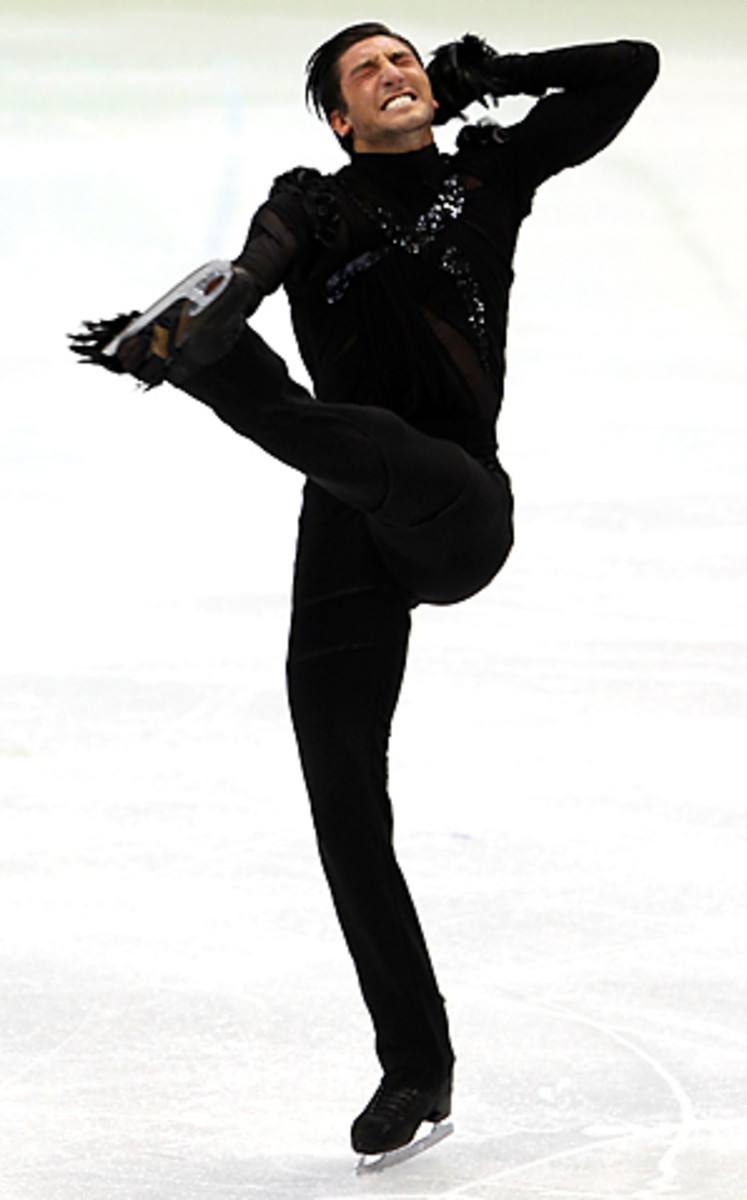Three skaters break free from pack in men's short program


VANCOUVER, British Columbia -- The men's short program put into focus what had been a wide-open field Tuesday night, as three very different skaters separated from the pack and put themselves in position to take the gold.
The leader is the favorite, Russia's Evgeni Plushenko, the 27-year-old defending champion, who skated early in the evening and put up 90.85 points, largely on the strength of a stunning array of jumps, beginning with the monstrous quadruple-toe, triple-toe combination that opened his program. Just .55 behind him, however, was American Evan Lysacek, the defending world champion, who scored 90.30 points without attempting a quad. Lysacek made up for it with higher program component scores and better footwork than Plushenko.
The same formula was used by Japan's Daisuke Takahashi, 23, who stood third, just .05 behind Lysacek, propelled by a dazzling straight-line step sequence. He also didn't attempt a quad. All three were clean, bold and powerful. None of the three are very balletic skaters. So it will, as always, come down to Thursday's free skate. Still within striking distance are Japan's Nobunari Oda, who trails Plushenko by exactly six points, and Switzerland's Stephane Lambiel, who is 6.22 back and in fifth. Johnny Weir of the U.S., who skated a clean program, is in 6th place, 8.75 points behind Plushenko, and Canada's Patrick Chan, who stepped out of his opening triple axel and then had a time violation for skating beyond his music, is in 7th, 9.73 points back.
The biggest casualties for the evening? That would be a tossup between France's Brian Joubert, who plotzed his opening quad combination and never recovered, finishing a distant 18th. And two-time U.S. champion, Jeremy Abbott, who popped a single axel then doubled a triple lutz, to finish 15th.
"I don't know what happened," the 24-year-old Abbott said afterward, looking as if he'd just emerged from 12 nights in a bat cave. "I didn't feel nervous, but on those two jumping passes, it just disintegrated."
Plushenko, who is attempting to become the first man to win back to back Olympic golds since Dick Button ('52, '56), again proved he is a nerveless competitor. Operating on the theory that lighter is faster, Plushenko had only a banana all day long -- he says he's lost six pounds since arriving in Vancouver -- a diet that he later said made his muscles feel tired and sore. If so, it sure didn't show. He rattled off the quad-triple combo, a triple axel, and finally a triple lutz early in his program -- compiling 32 points on the three jumps alone.
By contrast, Lysacek received just 27.10 points for his three jump passes, and Takahashi only 26.70. But Lysacek and Takahashi made up much of that ground by scoring much higher in their step sequences, and also getting higher program component (read: artistic =scores). Of special interest was Plushenko's transition mark, which had been the subject of considerable debate in the last couple of weeks after he admitted not even doing transitions after winning Europeans this year. The judging community, apparently, was paying attention. Plushenko earned just 6.80 points for his transitions in the short program, compared to 7.95 for Lysacek and 7.50 for Takahashi. Asked about the discrepancy, Alexei Mishin, Plushenko's coach, explained: "It's the result of the information war against him." Then, he fired a salvo at Lysacek and Takahashi for failing to attempt a quad: "The quadruple jump is like the slogan of the Olympic Games, 'higher, stronger, faster' ... Skating without a quad is like going back in time to when [Viktor] Petrenko [1992 Olympic champion] and [Alexei} Urmanov [1994 Olympic champion] were winning."
That's Mishin's pitch. The other side of the coin is that Plushenko really hasn't changed much since he won in 2006, and his somewhat robotic, passionless style looks out of date. It's clear, judging from the mediocre marks he received for his spins and footwork, that Plushenko will need every jump in his arsenal -- he is talking about putting two quads in his long program -- to stay ahead of Lysacek and Takahashi on Thursday, assuming those two avoid major mistakes.
"It gets more difficult each Olympics," said Plushenko, who has a silver medal from 2002 to go with the gold he won in 2006. "It's not because I'm getting older. It's that you have to prove yourself all over again. Gold, silver, bronze, fourth place ... I will take any result."
He shrugged. "I'm already a part of history."
